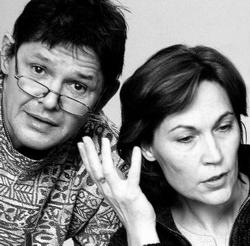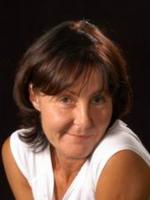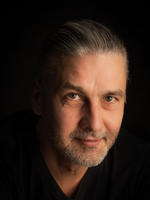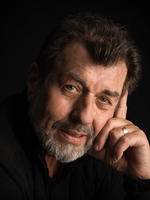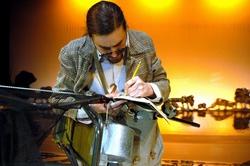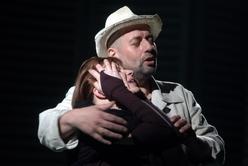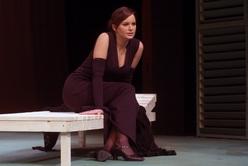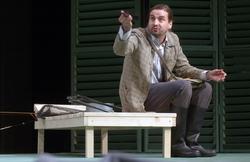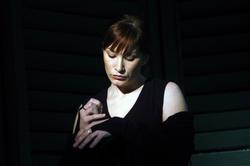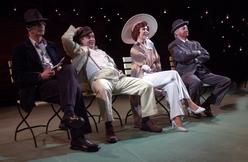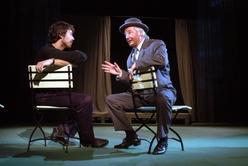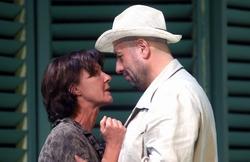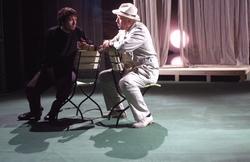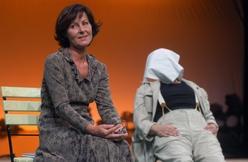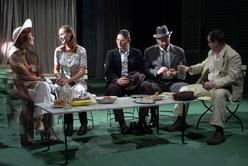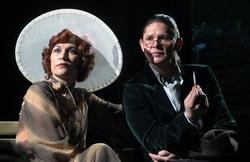Chekhov’s Sea-gull soared up to the stage heights
Tomáš Hejzlar 15. November 2004 zdroj Haló noviny
Although the Brno performance was not ablaze with modern producer’s visionariness, it provided a lot of space to the spectator’s fantasy – and this may not be overlooked. After all Chekhov is a master of an originally perceived idyllic that does not mean stale indolence. Chekhov interprets ideals that must be lived through, understood and returned to in thoughts… It became a kind of reflection of what the director can find in Chekhov in order to grip the audience and not to provoke excessively. Chekhov’s texts are sufficiently inspiring themselves. In his three recent productions, Černín, the director, came closest to the statement by Sean O’Cassey that “in the presence of Anton Pavlovich Chekhov every person involuntarily feels the desire to be simpler, more truthful, more himself, i.e. without the bright garment of literary phrases and modern words as well as all other cheep bon mots”.
Černín revised substantially Josef Topol´s translation, more precisely shortened it. However, the modifications were made sensitively, almost with reverence and understanding for a dramatic shortcut, for development’s acceleration. The principle of the opening scene of the “theatre in theatre” when the auditorium is not covered in dark yet and becomes thus a more active co-creator of everything that is to happen soon, is justified: Chekhov is alive, Chekhov is about us…and perhaps in us as well! Without any formal problems, this gradual initial opening of a play about a man and his world in the mirror of time and his surroundings unfolds with the help of a functionally well exploited stage designed by Jan Dušek as guest where the actors pass day and night to represent compellingly the ancient and even more ancient times that are not so remote in time actually...
The actress Irina Nikolayevna Arkadina who is getting old, is not a usurpative matron this time, as represented by Irena Konvalinová, she is less domineering and she is rather introverted and self-critically practical. She is able to overcome all the traps by Chekhov at the Brno scene almost with elegance: she surprises by unsuspected sports performances, “spicing up” the extensive epic and even boring development of the scenes which is quite typical of Chekhov. Her whims do not make a senile impression, they are made with a sense of certain exaggeration, maybe sometimes too realistic (the jogging scene), rather than in order to torment her actor’s (and spectator’s) neighbourhood.
Then there is Konstantin, a young man, her son – natural, with a young melodic voice and authentic “Romeo’s” spontaneity of movement. He is represented in this way very well by Lukáš Hejlík, alternated by Ondřej Veselý. Similarly like Karel Janský represents his Peter Nikolayevich Sorin. Arkadina´s stage brother completes this mosaic gradually created by the different human stories to the resulting whole thanks to the character, even charismatic and sensitively acted performance of its interpreter. He does not want to surpass those who outline the vault of the whole construction in the first part.
Too Comedically Lightened Seagull
Kateřina Bartošová 5. February 2004 zdroj Lidové noviny
Zdeněk Černín Studied Chekhov’s Seagull in the Brno Municipal Theatre
The introductory scene of preparations to Treplev’s performance is played at switched on auditorium from where the actors are getting on the stage, going up and down the staircase many times. It has its own logic, it is a theatre in the theatre. However, the initial scene characterizes the comic nature of the performance too.
Portrays of figures accent their ridiculous sides, which opens a space for attractive dramatic performances. One of them is offered by Irena Konvalinová as Madame Treplev in a little exaggerated but still charming study of the hysteric and affected artist.
Disintegration of attention to all figures whose parts complete mutually is quite successful, even after erasures.
Černín’s performance, given on a remarkably illusive stage with a scintillating level of the lake, works with a shortened text enabling a more dynamic course of events suitable to the comedic position of the first half. Instead of Chekhov’s pauses, Černín lets the figures roar and run all around the theatre creating thus rather funny figures and situations.
Černín Produced the Seagull with Humour and in Short
Simona Polcarová 28. January 2004 zdroj Rovnost
It cannot be denied that Černín can select suitable principals for his heroes. His vision of Arkadin with her perfect exactness and all fancies of cosseted star is shaped well by Irena Konvalinová who has a great sense of exaggeration. The part of Konstantin Treplev is played by Ondřej Veselý as a guest in the Brno Municipal Theatre, a new and meditative type of young actor who can go deep into the core of the character (alternating with Lukáš Hejlík). The adequately decadent Jitka Čvančarová (alternating with Helena Dvořáková) appears untypically as careworn and dispirited Mascha, Patrik Bořecký as Trigorin (sharing the part with Martin Havelka) remains quietened and not very emphatic this time. The most difficult task was that of Pavla Ptáčková in Nina’s part as she was to play a girl in whom unexpected feelings and admiration to the writer wake up but her love has no chance to bloom out on the stage. At the same time, she is to manifest herself as a bad actress lacking talent. That is why her performance may seem inconsistent, but it must be admitted she coped with the demanding part with honour.
The Theatre Is Going Down, Just Stumps Have Been Left
Jiří P. Kříž 23. January 2004 zdroj Právo
Zdeněk Černín, this time with the dramatic advisers Viktor Kudělka and Blanka Fišerová, demonstrated their strong sense of shortening Czechov’s Seagull in the Brno Municipal Theatre where the comedy about people loving somebody else than they are loved by had two first nights in the middle of January.
The work with a text is a great creative device in a lot of Černín’s productions.
The Seagull on the stage that has not presented this title in its fifty-year history has another great name on the shield – Josef Topol as a translator. He was not focused on complete works of dramatic celebrities, he only devoted to the plays close to his heart. This may be why his Seagull or Romeo and Juliet belong to a little different cask of excellent translations.
To complete the listing of creative spirits of Černín’s Seagull, the scenographer Jan Dušek should be mentioned too. His illusion of water level reflecting the opposite shore of the lake where Irina Arkadin’s summer residence is situated is perfect.
Surely not only due to the coincidence of names the part of the slightly ageing actress Arkadin was entrusted to Irena Konvalinová, not getting out of her youth yet. Though her first night’s performance was somewhat overexposed, people will talk about her Arkadin. And they will also talk about her unhappy, misapprehended son Treplev, tempter of new artistic forms who is in love with Nina Zareczna. Treplev is alternated by Ondřej Veselý and Lukáš Hejlík. Zareczna, a young Thalia adept longing for the writer Trigorin, is played by Pavla Ptáčková.
Two figures came out miraculously of the Černín’s Seagull who are usually in the shadow of the main characters: Mascha and Trigorin. On the first premiere, the unhappy girl having no goal and sense of life, in love with Treplev, getting hooked on alcohol in the hopelessness of rural time killing, was modelled by Jitka Čvančarová as a mysterious figure.
On the second premiere, Helena Dvořáková added Mascha a piece of her fatality, which was no less an experience. Arkadin’s partner, a dandy loving just himself, is alternated by Patrik Bořecký and Martin Havelka… They both accent other traits of character of the flimsy but successful writer who is looking in vain for his great theme.
The Brno Seagull Remained Dignified
David Kroča 22. January 2004 zdroj Hospodářské noviny
The director Zdeněk Černín used the excellent translation by Josef Topol in which he crossed out boldly (sometimes unmercifully). The focus of action and dramatic acting is shifted to the first part of the production framed with the performance of Treplev’s decadent play on Sorin’s farm and the fast departure of guests at the end of the original third act.
After the interval only a fatal meeting of Nina Zareczna and Konstantin Treplev takes place in front of a transparent decoration with a merry society eating and drinking in the background which laughing disturbs intentionally.
Černín interprets the key character of Nina in an interesting way. On the one hand she is speaking about clear feelings and love to art, on the other hand she is uncovering her provoking dress under the cape indicating dramatic art need not be her single profession. Konstantin’s death comes then as unexpected, but logic full stop behind the series of unrequited feelings.
Paradoxically, the dominant figure of Černín’s presentation is neither Nina or Konstantin, but Arkadin. The elderly actress was played by Irena Konvalinová as a woman keeping herself perfectly fit. Though she herself has a lot of professional deformations, she controls firmly and terrorizes people around her. The writer Trigorin engulfed in work, to whom Martin Havelka (alternating with Patrik Bořecký) impressed the appearance of put-upon and resigned lover, is suffering most.
Though the Seagull was put on with the traditional subtitle “comedy of four acts” in the Brno Municipal Theatre, neither the producers nor the actors set out for the journey of noncommittal lampooning or cheap joking. Chamber conversation is gradually creeping into the mosaic of cheerful episodes to become finally the only expressive means.
Zdeněk Černín Aims and Shoots Exactly and Understands Chekhov
1. December -1 zdroj Scena cz
The author sketches the milieu in introductory dialogues of Masha and teacher Medvedienko, Treplev and Sorin – the village for the “gentry” represents “boredom”. The principal theme of the play – fatal passing of people when love and feelings are not requited by the right ones. Painful are the moments when idols reveal to their counterparts they suffer from love to other ones. Gradually, all the figures are being revealed as far as the final exculpation.
The designer Jan Dušek highlighted certain melancholy on the horizon (a lake and trees on the horizon). There is also made an illusion of running time. Then, he stressed wood and pergolas as village elements. He was sober as for the furniture. This scene design helped unclose a dramatic expression and mental processes and motives of individual figures. The costumes went together as well. They corresponded to the scene in colours and matched with individual figures. The atmosphere of the play was completed with music. The composer David Rotter bet mainly on the guitar.
Dramatic performances were manifested especially in pairs – conflicts and catharses always happen in the Seagull between two people. Certain non-fulfilment in love is expressed by Polina (Miroslava Kolářová) and Dorn (Zdeněk Junák). Among other parts, Nina Zareczna played by Pavla Ptáčková attracted attention in spite of her evident indisposition. In the first half of the play, when she represented an immature and inexperienced young lady, she was not so convincing. But in the second half of the play she managed to express her unhappy, unrequited love. Madame Treplev played by Irena Konvalinová affects audiences as a magnet. Another female performer, Jitka Čvančarová, scored strongly. Her Masha seemed very eccentric. In spite of her disappointment and spleen, Jitka Čvančarová impressed a large-dimension soul to her figure.
Treplev played by Ondřej Veselý coped gallantly with the chair scene at the beginning of the play. He gradually attracted attention of the audience, but in no case put it on. He held respectfully the figure of emotionally disrupted and blundering man. Patrik Bořecký was interesting as well. He performed Boris Trigorin in a different position than his typical roles. He balanced towards an outsider trying to get used to his position in the society as well as Madame Treplev’s dominion.
The director Zdeněk Černín aims and shoots exactly - Treplev throws a shot seagull in front of Nina (“Soon I shall kill myself in the same way,” Treplev says). The seagull returns to the stage in the gradated finale – a trophy is standing on Treplev’s desk. A cone of light closes above. “Konstantin has shot himself dead.” The audience is silent, quite a long time passes until they start applauding. Seagull’s laughter cannot be heard either...

